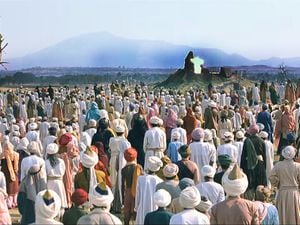Re-run for blockbuster that sparked Sikh fury
Bollywood film screenings were cancelled after it provoked an outcry and the evacuation of a Wolverhampton cinema. It is now returning to Indian screens

When Bollywood blockbuster Nanak Shah Fakir was first shown in Britain three years ago it prompted a furious outcry.
The opposition to the film led to a mass demonstration at a Wolverhampton cinema, which had to be evacuated following a sit-in protest, and the film’s eventual cancellation and removal from worldwide distribution.
A biopic of Sikhism founder Guru Nanak, the main bone of contention with the film was its depiction of the Guru and family members in human form – something which the religion strictly prohibits.
Now it is back, and although the 2018 version has been reworked by producers it is still dividing opinion, despite being given the green light by the Central Board of Film Certification (CBFC).
It was due to be released throughout India on Friday following a directive from the Indian Supreme Court, but a combination of legal challenges, threats of violence and more protests, the film was absent from cinema screens across large swathes of the country.
Bhajan Devsi, a community leader in Wolverhampton, explained: “The controversy surrounding this film has never really gone away since it was first screened in 2015.
“As well as using actors and actresses depicting the Guru and members of his family, which is considered to be against the Sikh philosophy, there are other issues.
“Some of the language used from the Holy scriptures, and many people say that the story is not accurate.”
Produced by celebrated author Harinder Sikka, Nanak Shah Fakir claims to be the first film on the life of Guru Nanak.
According to its promo sheet, it follows the Guru on an epic journey across the globe, spreading the Lord’s message of equality, peace and ‘Ik Onkar’.
On its first release in 2015, it received CBFC clearance and was initially backed by the Akal Takht, the highest seat of Sikhs.
But within days of it appearing at cinemas in India the protests began, spurred on by a number of influential Sikh bodies publicly objecting to its personification of the Guru. The all powerful Shiromani Gurdwara Pabandhak Committee (SGPC), which oversees the running of temples, called fr a worldwide ban.

Meanwhile, here in Britain a similar tale was unfolding.
On April 19, 2015, Cineworld in Wolverhampton was evacuated after protestors stormed into a screening of the film and staged a sit-in protest.
The chain, along with Odeon, subsequently cancelled all further showings.
By the end of the month amid a slew of cancellations in other countries with sizeable Sikh populations, the filmmakers withdrew Nanak Shah Fakir completely in order to seek SGPC approval.
They went back to the drawing board and reworked sections of the film, in an effort to comply with a series of SGPC demands.
Significant modifications were made. Guru Nanak’s character, originally played by actor Harish Khanna, was converted to animation.
The SGPC gave it the go ahead, despite the fact that the characters of Guru Nanak’s parents and sister continued to be played by real-life actors.
Everything appeared to be set for a full release, with Viacom18 Motion Pictures signing up to promote it, and Bollywood superstar Akshay Kumar giving the film his seal of approval.
But as the April 13 release date approached, a number of powerful Sikh bodies and individuals started to object to it, and the issue was taken to India’s highest court.
Last Tuesday judges ruled in favour of its release, arguing that as the CBFC had cleared the film there was no legitimate grounds to ban it.
It also asked state governments in India to ensure law and order, stating that freedom of expression should not be curbed.
One last SGPC petition for a review of the decision was rejected, and the film was finally released to coincide with the holy festival of Vaisakhi.
There was one last twist, as the Akal Takht excommunicated Mr Sikka from the Sikh religion.
However, it will not be shown in the state of Punjab, where filmmakers have held it back for the time being, citing ‘the sensitivity of the issue and the public sentiment involved’.
And no British cinemas have plans to screen the film, a situation that Mr Devsi says is unsurprising.
“There is a lot of concern that by showing the film we would see a return of the protests that happened last time, so I don’t expect any British cinemas to show it for the moment,” he said.
“I think they will wait and see the reaction in India first.
“There is still extremely strong opposition to the film, despite the changes that have been made to it.
“The interesting thing is that apart from a two minute long trailer, most people have still not seen the film’s actual content.”





